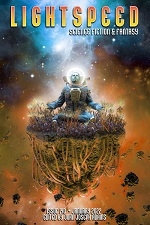“Dissent: A Five-Course Meal (With Suggested Pairings)” by Aimee Ogden
“In the Beginning of Me, I Was a Bird” by Maria Dong
“In the Cold, Dark Sea” by Jenny Rae Rappaport
“Up Falling” by Jendayi Brooks-Flemister
“An Address to the Newest Disciples of the Lost Words” by Vanessa Fogg
“Cale and Stardust Battle the Mud Gobblers of Hudson Valley” by Lincoln Michel
Reviewed by Mike Bickerdike
This issue of Lightspeed contains 4 new short stories and 2 new pieces of flash fiction. The stories are quite varied in tone and subject matter, but it is not an especially strong issue of the magazine.
“Dissent: A Five-Course Meal (With Suggested Pairings)” by Aimee Ogden is ‘flash fiction’ with a difference. The story is presented in the form of a menu, with ‘drink’ pairings, but it’s essentially a polemic railing against inequalities and disrespect for the LGBTQ+ community. I can’t help feeling the menu idea detracts from the piece rather than enhancing it, and the whole comes across foremost as strident social commentary rather than fiction, though doubtless there’s an audience for this sort of thing.
“In the Beginning of Me, I Was a Bird” by Maria Dong is quite an intriguing fantasy short story. The fall of mysterious seeds leads to sickness and death for those they land on, but the seed infection also enables the victims’ minds to hop from animal to animal thereafter. The title is somewhat disingenuous; in the beginning of the tale the protagonist is a lonely woman and then becomes a cat and only later, a bird, though this point is pedantry perhaps. The story evolves into a study of the protagonist’s relationship with her female soulmate. While quite engaging in places, the occasionally clunky language and rather weak conclusion rather lessen its appeal, but it’s still probably the best new tale in this issue of Lightspeed.
“In the Cold, Dark Sea” by Jenny Rae Rappaport is another piece of flash fiction. It tells a tale of sirens rising up to avenge the death of whales from whaling boats. The tale is fine, in a sense, but it lacks any novelty—the idea has been fictionalised many times. Flash fiction needs to offer something new, otherwise it’s just very short fiction which, due to its brevity, is unable to deeply engage the reader.
“Up Falling” by Jendayi Brooks-Flemister offers an interesting SF scenario—the need to transport a young woman off a dying Earth to a colony on the Moon. Unfortunately, there are two key problems in the tale’s execution; firstly, the jump technology itself seems so badly engineered that it stretches credulity beyond what many readers will easily accept, and secondly, the reasons for the characters’ actions and motivations are revealed too late in the piece, making the first half rather confusing.
“An Address to the Newest Disciples of the Lost Words” by Vanessa Fogg meets the definition of short fiction only marginally, which may be challenging for some readers, as there is no story arc, no defined protagonist and no dramatic tension. The piece presents an address on the nature of ‘Lost Words’, which are presumably words of power, in the sense of spells or enchantments, though their effect and use is not explained. Avoiding a traditional structure, the aim of the piece is perhaps to provide poetic imagery, insight or allegory. It’s success in achieving these things is not obvious.
“Cale and Stardust Battle the Mud Gobblers of Hudson Valley” by Lincoln Michel reflects the anxiety the younger generation have that they will pay the price for climate change, while the wealthier older generation will largely get away with it. A young couple move upstate from Manhattan to live beside the Hudson, but problems of the rising sea levels follow them. The river is being dredged by ‘mud gobblers’ to provide sea walls for the city and damaging the banks of their property. Concerns over the methods and ramifications of addressing climate change are doubtless common and genuine—and the problems are indeed significant—but this short story is not especially successful at addressing the issues. The young couple are thinly characterised, and the damaging work the mud gobbler machines undertake seems unlikely. Taken together, this tale reads like a social complaint that is less powerful than the topic probably merits.
More of Mike Bickerdike’s reviews and thoughts on science-fiction can be found at https://starfarersf.nicepage.io/
 Lightspeed
Lightspeed